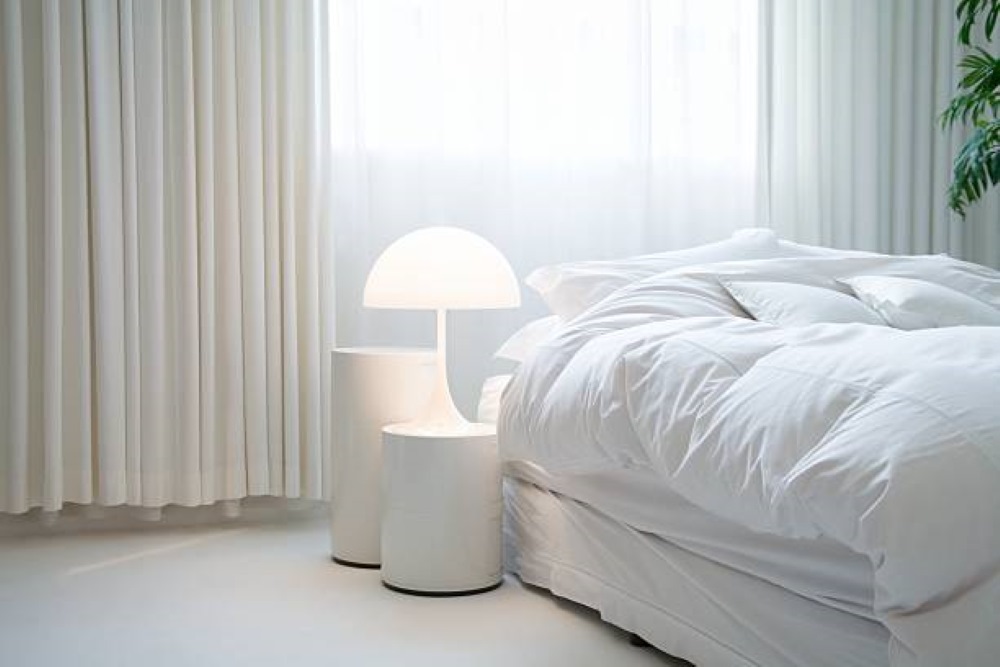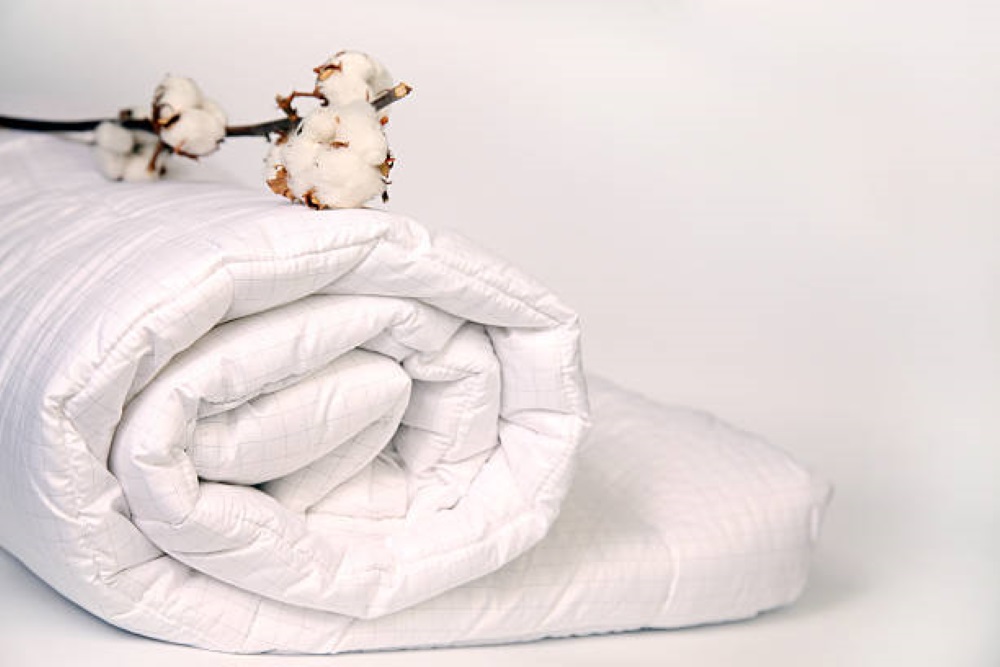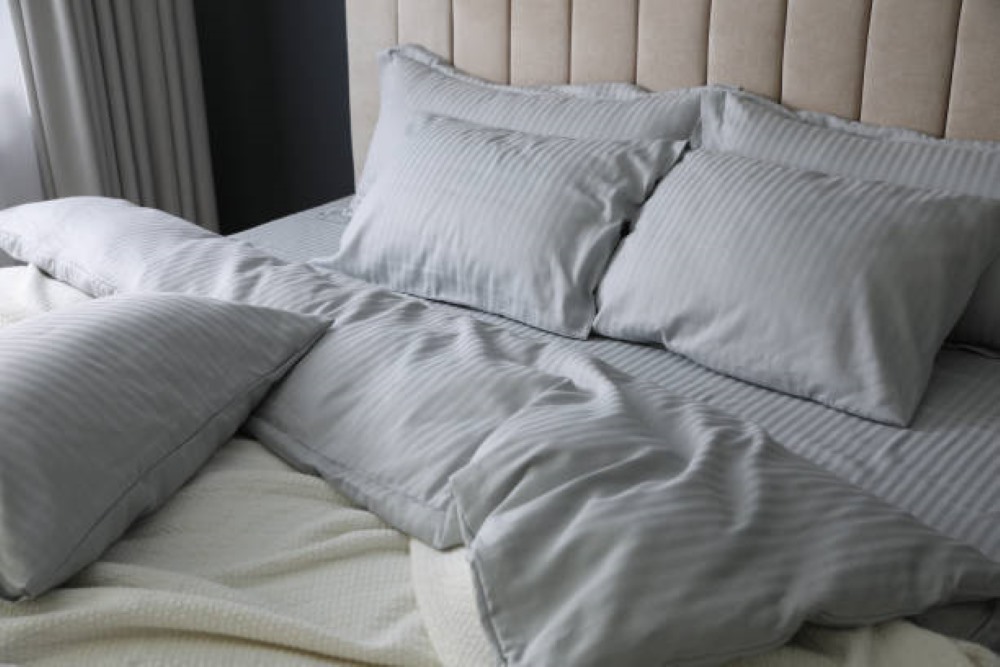Embrace the blend of sustainability and comfort with an organic comforter. Ideal for anyone looking to improve their sleep quality while doing right by the environment, these comforters stand out for their gentle touch and steadfast quality. In this guide, we’ll help you navigate the choices to find your best fit.

Key takeaways
- Organic comforters are eco-friendly, hypoallergenic, and offer long-lasting quality, aligning health with environmental responsibility.
- Choice of comforter material depends on personal preferences surrounding warmth, insulation, breathability, and maintenance, with options like organic cotton and down alternatives available.
- Maintain your organic comforter through proper washing, drying, and storage to prolong its life and preserve its natural benefits.

Discover the benefits of organic comforters
When the quest for the perfect night’s sleep meets the journey towards an eco-conscious lifestyle, the organic cotton comforter stands out as the hero. Offering more than just coziness, these comforters are woven with benefits that touch both your skin and the soul of the planet.
Unraveling the threads of their advantages reveals the earth-friendly materials, including recycled materials, hypoallergenic properties, and enduring quality that stays as long as your dreams dare to last.

Earth-friendly materials
Nestled in the heart of organic comforters lies a commitment to the planet. The materials, such as GOTS certified organic cotton and responsibly-sourced alpaca wool, are not only soft to the touch but also kind to the earth. These earth-friendly materials are free from the harsh chemicals typically used in conventional bedding, making them biodegradable and a testament to sustainability.
Every thread tells a story of respect for the natural world, aligning your peaceful slumber with earth’s well-being, allowing you to sleep soundly.
Hypoallergenic properties
For those who have ever woken up with itchy eyes or a runny nose, the hypoallergenic properties of organic comforters are a breath of fresh air. Without dyes and chemicals, these comforters are a sanctuary for sensitive skin, offering a barrier against the allergens that commonly inhabit our beds.
Wool-filled comforters go one step further, reducing moisture and deterring dust mites, granting a reprieve from allergies and ensuring that every night is a peaceful escape from irritation. In fact, they can be considered the best comforter for those seeking relief from allergens.
Long-lasting quality
The allure of an organic cotton comforter extends beyond its immediate softness to the promise of enduring through years of use. These comforters are the epitome of resilience, crafted to withstand the ebb and flow of trends and the wear and tear of daily use.
Luxurious yet durable, they offer the perfect balance of quality and comfort, ensuring that your investment in good sleep continues to pay dividends for a wonderfully long time.

Organic cotton comforter vs. down comforter: Which one is right for you?
In the comforter conundrum, the choice between an organic cotton comforter and a down comforter often hinges on personal values and comfort preferences. While one cradles you in eco-friendly fibers, the other offers a traditional embrace of warmth.
Navigating this decision involves comparing their attributes – warmth, insulation, breathability, and care – to help you select the comforter that best aligns with your needs and convictions.

Warmth and insulation
When the temperature drops, a down comforter’s fluffiness and warmth are unparalleled. Known for their excellent warmth-to-weight ratio, these comforters are a cozy ally against the cold.
However, organic cotton comforters, with their moisture-wicking properties, offer a hypoallergenic alternative that can regulate body temperature without sacrificing softness. Whether you’re seeking an extra layer of warmth or a breathable duvet insert that keeps allergens at bay, the choice is yours to make.
Breathability and moisture-wicking properties
On cool, balmy nights, the breathability of a comforter becomes the lynchpin of comfortable sleep. Organic cotton comforters excel in allowing air to circulate, a boon for those who sleep hot. Down comforters, while insulating, still promote air circulation for temperature regulation.
And for those seeking a middle ground, an alternative comforter made with alternative down offers a blend of coziness without compromising on breathability, ensuring a restful slumber through every season.
Care and maintenance
The longevity of your comforter is closely tied to its care. Organic cotton comforters invite regular washing to maintain their hypoallergenic benefits and quality. Down comforters, on the other hand, require more meticulous care to ensure their fluffy softness and to remove potential allergens or unwanted stains.
Yet, down alternative options present a convenient middle ground, marrying the plushness of down feathers with the ease of maintenance, making them an attractive choice for the practical-minded.

The top organic comforters and their offerings
As the popularity of organic bedding blossoms, so too does the variety of choices available to the discerning buyer. Leading the charge, top organic comforter brands offer a plethora of options, from wool-filled (wool filling) to down alternative, to all-season comforters. Each has its own unique benefits, ensuring that you can find and purchase a comforter that not only matches your ethical standards but also your personal warmth and comfort preferences.

Wool-filled comforters
The organic wool-filled comforter is a testament to natural luxury. It offers:
- Wool’s inherent hypoallergenic qualities.
- Durability bestowed by its natural elasticity.
- Comfort and peace of mind.
- Versatility with various types tailored to different climates.
- A natural and durable option for bedding.
Down alternative comforters
For the ethically inclined, down alternative comforters replicate the lofty softness of down without any feathers. These cruelty-free wonders are filled with materials like cotton and polyester, ensuring a cozy night’s sleep.
Furthermore, high consumer ratings attest to their quality, making them an attractive option for those looking to snuggle up in good conscience.
All-season organic comforters
All-season organic comforters stand ready to adapt to your body’s changing needs year round. With options that include detachable layers or ones suitable for layering, these comforters are designed for practicality and versatility.

Choosing the perfect size and weight for your organic comforter
The comfort and effectiveness of your organic comforter depend on the right size and weight that fit your bed and personal comfort. Given the variety of options, knowing what works best for your space and sleeping habits is crucial. Whether you’re looking for a lightweight option for the summer months or a heavier comforter for the chill of winter, understanding the nuances of comforter sizing and weight will guide you to your ideal bedding companion.

Size guide
Selecting the correct size for your organic comforter is crucial for achieving the ideal look and feel for your bed. With sizes ranging from Twin, Twin XL, Full Queen, to Oversized King, there’s a fit for every mattress. Remember to account for mattress thickness and your personal preference for draping when making your choice, as this will ensure your comforter covers your bed beautifully without skimming the floor.
Weight options
The weight of your comforter can greatly influence your sleep quality. A light weight option may be perfect for those who run hot or reside in warmer climates, while a heavy weight comforter could be the ideal choice for those needing an extra layer of warmth during colder months.
Consider your bedroom’s temperature and your own warmth needs when selecting the perfect weight for your organic comforter.

How to care for your organic comforter
Proper care of your organic comforter ensures it remains a cozy retreat for years to come. With the right approach to washing, drying, and storing, you’ll protect the integrity of the materials and prolong the life of your comforter.
By following these tips, you can keep your bedding in pristine condition and ensure ongoing comfort and luxury night after night.
Washing and care instructions
Organic comforters are best cared for with a gentle touch, ensuring their longevity. Machine wash them on a gentle cycle with warm or cold water, using a plant-based detergent to maintain their natural softness.
Dissolving the detergent before adding your comforter can prevent residue from settling on the fabric, keeping your comforter fresh and clean for every slumber.

Drying tips
Drying your organic comforter correctly is as important as the washing process. Air drying is the gentlest option, but if you must use a dryer, opt for a low heat setting to preserve the fibers. Wool dryer balls can be a handy ally in the tumble dry low process, reducing time and minimizing wrinkles, ensuring your comforter stays fluffy and inviting.
Storage suggestions
When it’s time to store your organic comforter, choosing the right container is crucial. Breathable options like lidded baskets made from natural materials prevent mildew and maintain freshness.
Proper storage ensures that your comforter remains a welcoming haven, ready for when you need it next.

Accessorizing your organic comforter: Duvet covers and more
Transforming your bed into a cohesive and stylish oasis is simple with the right accessories for your organic comforter. From duvet covers that protect and add a flair of design, to coordinating pillows and sheets, these add-ons can elevate your sleep experience while maintaining an eco-friendly ethos. One popular feature to consider is corner tabs, which help secure your comforter in place.

Duvet cover
Organic cotton duvet cover is the perfect complement to your comforter, offering added protection and the opportunity to refresh your bedroom’s look with ease. Available in a multitude of colors and designs, these covers are breathable, soft, and practical, making them an essential part of your bedding ensemble.
Pillows and sheets
Complete your organic bedding set with matching pillows and sheets, ensuring every aspect of your bed is eco-friendly. The variety of styles available allows for a harmonious design, providing a tranquil and healthy space for you to end your day and greet the new morning.

Summary
Our exploration of organic comforters has led us through their eco-friendly and health-enhancing attributes, weighed them against traditional bedding, and offered insights into their maintenance for optimal longevity.
Choosing an organic cotton comforter is a commitment to improving the quality of your rest and nurturing the health of our wonderful environment. Here’s to nights of serene slumber, comforted by the knowledge that your choice benefits both you and the earth.

Frequently asked questions
Why are organic comforters considered environmentally friendly?
Organic comforters are environmentally friendly because they are made from natural materials like organic cotton and responsibly-sourced wool, which are biodegradable and crafted without harmful chemicals, reducing environmental impact.
Can organic comforters help with allergies?
Yes, organic comforters can help with allergies by being hypoallergenic, free from dyes and chemicals, and reducing moisture conducive to dust mites and allergens. Consider using them if you suffer from allergies.
How often should I wash my organic comforter?
Wash your organic comforter regularly using a gentle cycle, mild detergent, and either warm or cold water to preserve its quality and hypoallergenic features.
What should I look for when buying an organic comforter?
When buying an organic comforter, look for GOTS or OEKO TEX certification for organic cotton, consider the weight and size, and ensure the brand aligns with ethical and environmental standards. These factors are important for making a sustainable and comfortable choice.